Fleurs du Mal Magazine


Or see the index
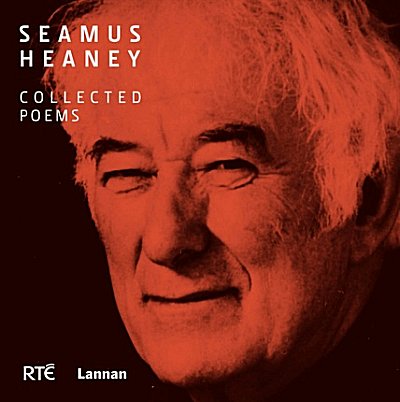
Irish Poet Seamus Heaney has died
Seamus Heaney, the best Irish poet since Yeats, has died aged 74. Heaney was born near Toomebridge, Northern Ireland. He was a teacher and had a distinguished career in poetry, winning the Nobel prize for literature in 1995.
Heaney had been awarded numerous prizes and received many honours for his work. He recently suffered from ill health.
Poetry
1966: Death of a Naturalist, Faber & Faber
1969: Door into the Dark, Faber & Faber
1972: Wintering Out, Faber & Faber
1975: Stations, Ulsterman
1975: North, Faber & Faber
1979: Field Work, Faber & Faber
1984: Station Island, Faber & Faber
1987: The Haw Lantern, Faber & Faber
1991: Seeing Things, Faber & Faber
1996: The Spirit Level, Faber & Faber
2001: Electric Light, Faber & Faber
2006: District and Circle, Faber & Faber
2010: Human Chain, Faber & Faber
In Memoriam Seamus Heaney 1939-2013
30 august 2013
fleursdumal.nl magazine
More in: Archive G-H, In Memoriam
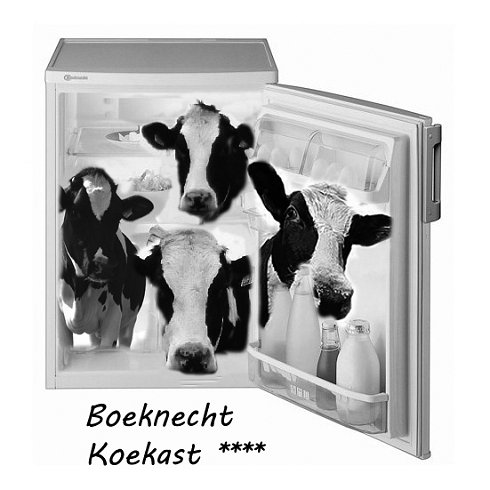
Freda Kamphuis:
Boeknecht Koekast, 2013, fotocollage
fleursdumal.nl magazine
More in: Freda Kamphuis, Kamphuis, Freda

Avondmaal
Bij het schilderij van Michael Triegel
Strak van zwartheid achterdoek. Of is het voorhang?
Wat zit hij daar te kijk in gillende stilte, aan een tafel
met mooi geplooid laken erover en ruimte voor
wel dertien man alleen. Zijn gezicht onbeschreven blad,
de haren eromheen lijken verse wondkorst als water
dat aan de randen van ruige sloten schoorvoetend ijs wordt.
Achter zijn rug onbekende steden, verzonnen plattegronden,
gekneusde dromen, krimpende en ruimende einders.
Als beloning voor deugdzaam leven een kers, een erg rode.
Vrucht van paradijs naast lege glazen. Hij vraagt zich af
of je kunt stoppen met springen. Agnus Dei. Ontferm u
Bert Bevers
© Bert Bevers: verschenen in Onaangepaste tijden, Zinderend, Bergen op Zoom, 2006, ISBN 90 76543 09 7
fleursdmal.nl magazine
More in: Archive A-B, Bevers, Bert
.jpg)
Delmira Agustini
(1886-1914)
Mi Musa Triste
Vagos preludios. En la noche espléndida
Su voz de perlas una fuente calla,
Cuelgan las brisas sus celestes pifanos
En el follaje. Las cabezas pardas
De los búhos acechan.
Las flores se abren más, como asombradas.
Los cisnes de marfil tienden los cuellos
En las lagunas pálidas.
Selene mira del azul. Las frondas
Tiemblan… y todo! hasta el silencio, calla…
Es que ella pasa con su boca triste
Y el gran misterio de sus ojos de ámbar,
A través de la noche, hacia el olvido,
Como una estrella fugitiva y blanca.
Como una destronada reina exótica
De bellos gestos y palabras raras.
Horizontes violados sus ojeras
Dentro sus ojos–dos estrellas de ámbar–
Se abren cansados y húmedos y tristes
Como llagas de luz que quejaran.
Es un dolor que vive y que no espera,
Es una aurora gris que se levanta
Del gran lecho de sombras de la noche,
Cansada ya, sin esplendor, sin ansias
Y sus canciones son como hadas tristes
Alhajadas de lágrimas…
Delmira Augustini poetry
fleursdumal.nl magazine
More in: Agustini, Delmira, Archive A-B
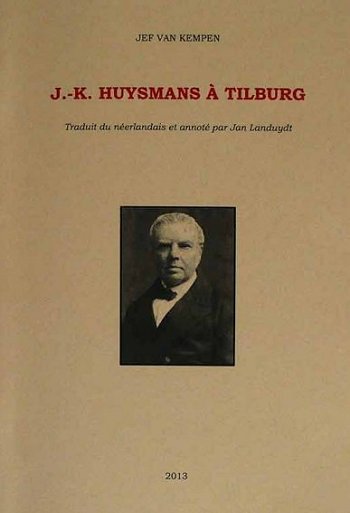
J.-K. Huysmans à Tilburg
Jef van Kempen
Translated from the Dutch and anotated by Jan Landuydt
[Mechelen / Paris] 2013
A translation into French of a biographical study of Huysmans by Jef Van Kempen. It was first published in the review, Tilburg. Tijdschrift voor geschiedenis, monumenten en cultuur, in 1988.
The study traces some of Huysmans’ Tilburg ancestors before giving an account of his relationship with his uncle, Constantijn. It details how Huysmans’ controversial work as a writer was viewed by his relatives and how it eventually led to his being effectively cut out of his uncle’s will.
JEF VAN KEMPEN
J.-K. Huysmans à Tilburg (1)
Traduit du néerlandais et annoté par Jan Landuydt
« A propos, ton nom en hollandais est Joris-Karel Huijsmans. Tu as écrit de l’allemand (2) ». C’est par cette remarque que Constantijn Huijsmans conclut sa lettre (3) du 26 décembre 1874 à son neveu (4) français Charles-Marie-Georges Huysmans, fils de son frère Victor, décédé. La raison de la lettre est le début littéraire de son neveu, le recueil de poèmes en prose Le Drageoir à épices, qui vient de paraître en octobre de la même année. La remarque de Constantijn Huijsmans concerne le nom de plume par lequel son neveu, pour mettre en évidence ses origines hollandaises, a par méprise signé son premier livre : Jorris-Karl Huÿsmans. L’auteur corrige ultérieurement son premier prénom (« Jorris » n’existe dans aucune langue), mais non le deuxième. Sous le nom de Joris-Karl Huysmans (5), il va jouer un rôle important dans la littérature française de la fin du dix-neuvième siècle et du début du vingtième. . . . . . . . . . . .
# read more on website www.huysmans.org
fleursdumal.nl magazine for art & literature
More in: Huysmans, Joris-Karl, J.-K. Huysmans, Jef van Kempen, Kempen, Jef van
.jpg)
Marcel Proust
(1871-1922)
Dordrecht
Ton ciel toujours un peu
bleu
Le matin souvent un peu
pleut
Dordrecht endroit si beau
Tombeau
De mes illusions chéries
Quand j’essaye à dessiner
Tes canaux, tes toits, ton clocher
Je me sens comme aimer
Des patries
Mais le soleil et les cloches
Ont bien vite resséché
Pour la grand-messe et les brioches
Ton luisant clocher
Ton ciel bleu
Souvent pleut
Mais dessous toujours un peu
Reste bleu.
Marcel Proust poetry
fleursdumal.nl magazine
More in: Marcel Proust, Proust, Marcel
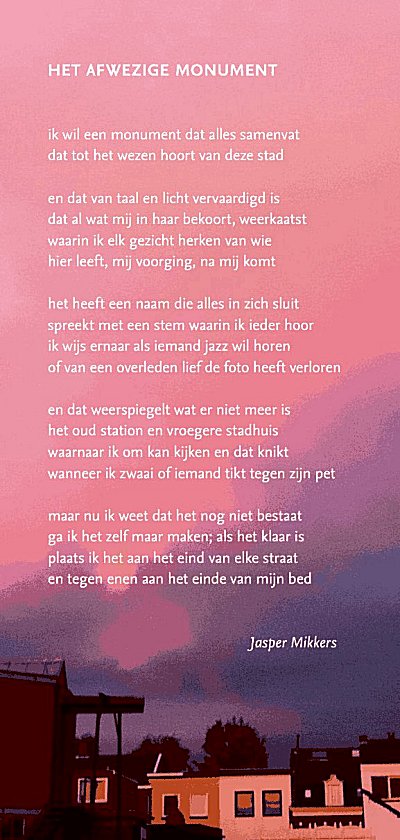
Het afwezige monument
door Jasper Mikkers
ik wil een monument dat alles samenvat
dat tot het wezen hoort van deze stad
en dat van taal en licht vervaardigd is
dat al wat mij in haar bekoort, weerkaatst
waarin ik elk gezicht herken van wie
hier leeft, mij voorging, na mij komt
het heeft een naam die alles in zich sluit
spreekt met een stem waarin ik ieder hoor
ik wijs ernaar als iemand jazz wil horen
of van een overleden lief de foto heeft verloren
en dat weerspiegelt wat er niet meer is
het oud station en vroegere stadhuis
waarnaar ik om kan kijken en dat knikt
wanneer ik zwaai of iemand tikt tegen zijn pet
maar nu ik weet dat het nog niet bestaat
ga ik het zelf maar maken; als het klaar is
plaats ik het aan het eind van elke straat
en tegen enen aan het einde van mijn bed
Jasper Mikkers: gedicht te gelegenheid van zijn installatie
tot zesde stadsdichter van Tilburg op 25 augustus 2013
tijdens Boeken Rond Het Paleis 2013 (organisatie stichting dr pj cools)
fleursdumal.nl magazine
More in: Archive M-N, City Poets / Stadsdichters, Mikkers, Jasper
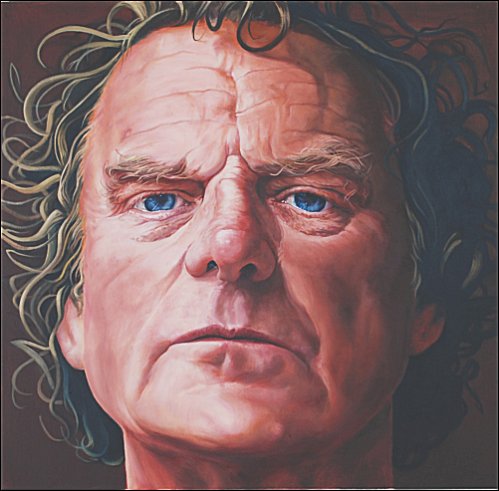
Poets’ portraits: Ivo van Leeuwen, 2013
Portret van Jasper Mikkers
Stadsdichter van Tilburg 2013 – 2015
©ivovanleeuwen
fleursdumal.nl magazine
More in: City Poets / Stadsdichters, Ivo van Leeuwen, Mikkers, Jasper

Gabriele D’Annunzio
(1863-1938)
Sopra un erotik
Voglio un amore doloroso, lento,
che lento sia come una lenta morte,
e senza fine (voglio che più forte
sia de la morte) e senza mutamento.
Voglio che senza tregua in un tormento
occulto sian le nostre anime assorte;
e un mare sia presso a le nostre porte,
solo che pianga in un silenzio intento.
Voglio che sia la torre alta granito,
ed alta sia così che nel sereno
sembri attingere il grande astro polare.
Voglio un letto di porpora, e trovare
in quell’ombra giacendo su quel seno,
come in fondo a un sepolcro l’Infinito.
Pace
Pace, pace! La bella Simonetta
adorna del fugace emerocàllide
vagola senza scorta per le pallide
ripe cantando nova ballatetta.
Le colline s’incurvano leggiere
come le onde del vento nella sabbia
del mare e non fanno ombra, quasi d’aria.
L’Arno favella con la bianca ghiaia,
recando alle Nereidi tirrene
il vel che vi bagnò forse la Grazia,
forse il velo onde fascia
la Grazia questa terra di Toscana
escita della casalinga lana
che fu l’arte sua prima.
Pace, pace! Richiama la tua rima
nel cor tuo come l’ape nel tuo bugno.
Odi tenzon che in su l’estremo giugno
ha la cicala con la lodoletta!
Voglio un amore doloroso di
Voglio un amore doloroso, lento,
che lento sia come una lenta morte,
e senza fine (voglio che più forte
sia della morte) e senza mutamento.
Voglio che senza tregua in un tormento
occulto sian le nostre anime assorte;
e un mare sia presso a le nostre porte,
solo, che pianga in un silenzio intento.
Voglio che sia la torre alta granito,
ed alta sia così che nel sereno
sembri attingere il grande astro polare.
Voglio un letto di porpora, e trovare
in quell’ombra giacendo su quel seno,
come in fondo a un sepolcro, l’infinito.
Gabriele D’Annunzio poetry
fleursdumal.nl magazine
More in: Archive A-B, D'Annunzio, Gabriele

Alfonsina Storni
(1892-1938)
A Madona Poesia
Aqui a tus pies lanzada, pecadora,
contra tu tierra azul, mi cara oscura,
tú, virgen entre ejércitos de palmas
que no encanecen como los humanos.
No me atrevo a mirar tus ojos puros
ni a tocarte la mano milagrosa;
miro hacia atrás y un río de lujurias
me ladra contra tí, sin Culpa Alzada.
Una pequeña rama verdecida
en tu orla pongo con humilde intento
de pecar menos, por tu fina gracia,
ya que vivir cortada de tu sombra
posible no me fue, que me cegaste
cuando nacida con tus hierros bravos.
![]()
fleursdumal.nl magazine
More in: Archive S-T, Storni, Alfonsina
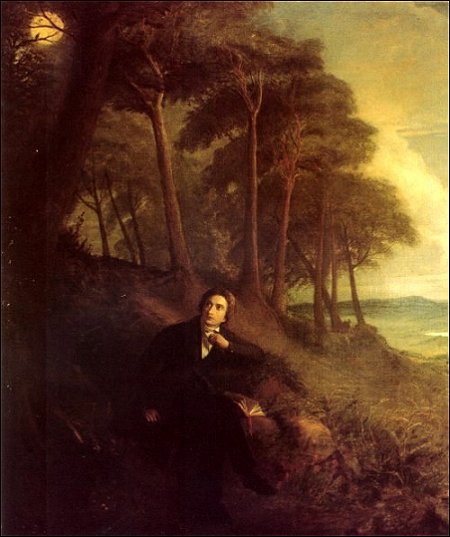
John Keats
(1795–1821)
Ode to a nightingale
My heart aches, and a drowsy numbness pains
My sense, as though of hemlock I had drunk,
Or emptied some dull opiate to the drains
One minute past, and Lethe-wards had sunk:
‘Tis not through envy of thy happy lot,
But being too happy in thine happiness,–
That thou, light-winged Dryad of the trees,
In some melodious plot
Of beechen green, and shadows numberless,
Singest of summer in full-throated ease.
O, for a draught of vintage! that hath been
Cool’d a long age in the deep-delved earth,
Tasting of Flora and the country green,
Dance, and Provençal song, and sunburnt mirth!
O for a beaker full of the warm South,
Full of the true, the blushful Hippocrene,
With beaded bubbles winking at the brim,
And purple-stained mouth;
That I might drink, and leave the world unseen,
And with thee fade away into the forest dim:
Fade far away, dissolve, and quite forget
What thou among the leaves hast never known,
The weariness, the fever, and the fret
Here, where men sit and hear each other groan;
Where palsy shakes a few, sad, last gray hairs,
Where youth grows pale, and spectre-thin, and dies;
Where but to think is to be full of sorrow
And leaden-eyed despairs,
Where Beauty cannot keep her lustrous eyes,
Or new Love pine at them beyond to-morrow.
Away! away! for I will fly to thee,
Not charioted by Bacchus and his pards,
But on the viewless wings of Poesy,
Though the dull brain perplexes and retards:
Already with thee! tender is the night,
And haply the Queen-Moon is on her throne,
Cluster’d around by all her starry Fays;
But here there is no light,
Save what from heaven is with the breezes blown
Through verdurous glooms and winding mossy ways.
I cannot see what flowers are at my feet,
Nor what soft incense hangs upon the boughs,
But, in embalmed darkness, guess each sweet
Wherewith the seasonable month endows
The grass, the thicket, and the fruit-tree wild;
White hawthorn, and the pastoral eglantine;
Fast fading violets cover’d up in leaves;
And mid-May’s eldest child,
The coming musk-rose, full of dewy wine,
The murmurous haunt of flies on summer eves.
Darkling I listen; and, for many a time
I have been half in love with easeful Death,
Call’d him soft names in many a mused rhyme,
To take into the air my quiet breath;
Now more than ever seems it rich to die,
To cease upon the midnight with no pain,
While thou art pouring forth thy soul abroad
In such an ecstasy!
Still wouldst thou sing, and I have ears in vain–
To thy high requiem become a sod.
Thou wast not born for death, immortal Bird!
No hungry generations tread thee down;
The voice I hear this passing night was heard
In ancient days by emperor and clown:
Perhaps the self-same song that found a path
Through the sad heart of Ruth, when, sick for home,
She stood in tears amid the alien corn;
The same that oft-times hath
Charm’d magic casements, opening on the foam
Of perilous seas, in faery lands forlorn.
Forlorn! the very word is like a bell
To toll me back from thee to my sole self!
Adieu! the fancy cannot cheat so well
As she is fam’d to do, deceiving elf.
Adieu! adieu! thy plaintive anthem fades
Past the near meadows, over the still stream,
Up the hill-side; and now ’tis buried deep
In the next valley-glades:
Was it a vision, or a waking dream?
Fled is that music:–Do I wake or sleep?
Ode aan een nachtegaal
Hartzeer en lome sufheid plaagt mijn geest,
Alsof ‘k een kerveldrank mij had bereid,
Of juist aan duffe opium was geweest
En was verzonken in vergetelheid:
‘t Komt niet door afgunst op jouw gunstig lot
Maar door te grote vreugd om jouw geluk, –
Dat jij, die vederlichte nimf van ‘t woud,
Vol melodiegenot
In ‘t schaduwrijke groen, zo druk
En zoetgevooisd een zomerzangfeest houdt.
O, gun mij een goede wijn! gekoeld bewaard
Diep in de grond, in jaren niet verzet,
Smakend naar Flora en de groene gaard,
Dans, Provençaalse zang, en zonnepret!
O, dat vol zuiderwarmte een glas hier stond,
Vol blozende en ware Hippocreen,
Met luchtbelkraaltjes glinsterend aan de rand,
En paars-gevlekte mond;
Dat ik mij laafde en uit het zicht verdween,
Met jou vervaagd in ‘t schimmig bomenland:
Vervaagd naar ver, versmolten, en gans kwijt
Wat tussen ‘t groen jij nooit hebt opgemerkt:
De sleur, de onrust en de narigheid
Alhier, waar men elkaars gekreun verwerkt;
Waar ziekte ‘t laatste, arm, grijs haar aantast,
Waar – ‘n bleke, magere schim – de jongen sterft;
Waar ‘t denken zelf al leidt tot diepe zorgen
En wanhoop’s loden last,
Waar ‘t oog van Schoonheid snel haar schittering derft,
Of nieuwe Liefd’ haar niet begeert na morgen.
Naar ver! naar ver! want ‘k volg jouw melodie,
Niet weggekard door Bacchus’ luipaard-span,
Maar op de blinde wiek der Poëzie,
Hoewel het trage brein dwarsliggen kan:
Teer is de nacht, bij jou daar in ‘t verschiet!
En ook, door al haar sterren-feeën omringd,
Zit op haar vorstentroon tevree de Maan;
Licht is híer echter niet,
Behalve wat uit hemelbriezen blinkt
Op somber groen en ‘t mos der slingerlaan.
Ik heb geen zicht op bloemen aan mijn voet,
Of welke wierook aan de takken hangt,
Maar raad in ‘t donker elk welriekend zoet
Dat bosje, vruchtboom wild, en gras ontvangt,
Geschonken door het passend jaargetij;
Rustieke egelantier en haagdoorn wit;
Viooltjes, snel verwelkt, door blad omhuld;
En ‘t oudste kind van Mei,
De muskusroos, waar nevelwijn in zit,
Op ‘n zomernacht met vlieggezoem gevuld.
In ‘t duister luister ik; en ik heb vaak
De Dood, die kalm maakt, half verliefd gekust,
Liefkoosde hem ook vaak met dichtersspraak,
Om lucht te geven aan mijn ademrust;
Nu meer dan ooit schijnt mij het sterven rijk,
Een middennachtelijk einde, vrij van pijn,
Terwijl jouw ziel zich uitstort uit ‘t gewas
En hoe hartstochtelijk!
Dan zong jij door: mijn oor zou nietig zijn –
En bij jouw requiem was ik wat gras.
Eeuwige Vogel! boreling vrij van dood;
Geen hongerbende ondermijnt jouw lot;
De stem die mij dit nachtuur heeft genood
Hoorde vanouds de keizer en de zot:
Misschien dezelfde zang die toegang vond
Tot ‘t droeve hart van Ruth, van heimwee ziek,
In tranen tussen ‘t vreemde koren staand;
Dezelfde die ‘t bestond
Vensters te openen, magisch met muziek,
Naar zeeschuim wild, in ‘n eens betoverd land.
Betoverd! juist het woord dat als een klok
Van jou mij terugluidt enkel naar mijzelf!
Vaarwel! De illusie mist de toverstok
Vaak toegedicht aan die misleidende elf.
Vaarwel! vaarwel! Jouw klaaglied vlucht ook al
Langs weiden hier, over de stille stroom,
De heuvel op, heeft nu een duik gemaakt
Diep in het volgend dal:
Was het een visioen, of wakkere droom?
Weg is het lied: – Slaap ik of ben ‘k ontwaakt?
Vertaling: Cornelis W. Schoneveld
Uit: Bestorm mijn hart, de beste Engelse gedichten uit de 16e-19e eeuw gekozen en vertaald door Cornelis W. Schoneveld, tweetalige editie. Rainbow Essentials no. 55, Uitgeverij Maarten Muntinga, Amsterdam, 2008, 296 pp, € 9,95 ISBN: 9789041740588
Bestorm mijn hart bevat een dwarsdoorsnede van vier eeuwen lyrische Engelse dichtkunst. Dichters uit de zestiende tot en met de negentiende eeuw dichter onder andere over liefde, natuur, dood en religie. Niet alleen de Nederlandse vertaling is in deze bundel te vinden, maar ook de originele Engelse versie. Deze prachtige bloemlezing, met gedichten van onder anderen Shakespeare, Milton, Pope en Wordsworth, is samengesteld en vertaald door Cornelis W. Schoneveld. Hij is vele jaren docent historische Engelse letterkunde en vertaalwetenschapper aan de Universiteit van Leiden geweest.
fleursdumal.nl magazine
More in: Archive K-L, John Keats, Keats, Keats, John

Hendrik Marsman
(1899-1940)
Doodstrijd
Ik lig zwaar en verminkt in een hoek van de nacht,
weerloos en blind: ik wacht
op de dood die nu eindelijk komen moet.
het paradijs is verbrand: ik proef roet,
dood, angst en bloed.
ik ben bang, ik ben bang voor de dood.
ik kan hem niet zien,
ik kan hem niet zien,
maar ik voel hem achter mij staan.
hij is misschien rakelings langs mij gegaan.
hij sluipt op zware geruisloze voeten onzichtbaar
achter het leven aan.
hij is weergaloos laf:
hij valt aan in de rug;
hij durft niet recht tegenover mij staan;
ik zou zijn schedel te pletter slaan.
ik heb nu nog, nu nog, een wild ontembaar
verlangen naar bloed.
Ontwaken
Ik lig nog te bed in de blinkende morgen
en hoor in mijn hart en daarbuiten het ruisen der nieuwe zee,
reuken en blijde geluiden
en de bloeiende geuren der kruiden
vervliegend als schuim in het zonlicht
en op de wind drijft het mee.
nu is er rust en een wijdheid vol nieuwe kracht;
voor mijn vertwijfeling en mijn stoutmoedigste droom
een onpeilbaar heelal:
water, zonlicht en gletschers
en ook bij nacht de kristallen
der glinsterende eeuwige sneeuw.
en hier – aan mijn zijde – het dal:
als de zachte gebogen kust van een klein en sluimerend meer;
zie hoe hij zich vouwt
in de bocht van een tere
en onuitputlijke droom.
.jpg)
Hendrik Marsman poetry
fleursdumal.nl magazine
More in: Archive M-N, Marsman, Hendrik
Thank you for reading Fleurs du Mal - magazine for art & literature